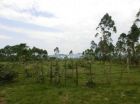(Press-News.org) When it comes to charitable giving, some countries open their collective wallets more than others. According to a new study in the Journal of Consumer Research, people who live in countries that promote equality in power and wealth are more likely to donate money than those who live in societies that expect and accept inequality.
"Our research examines whether cultural values can explain the different levels of charitable giving between different countries," write authors Karen Page Winterich (Pennsylvania State University) and Yinlong Zhang (University of Texas, San Antonio).
Across several studies, the authors looked at the extent to which a country's overall power distance—the extent to which a society expects and accepts inequality in power or wealth—impacts prosocial behaviors like donating money, volunteering time, or helping a stranger.
Their findings indicated that people in countries with higher levels of inequality feel less responsibility for helping others. Examining the issue even further, the authors asked study participants to donate to a cause for which the need was uncontrollable (providing food after a natural disaster) versus controllable (offering nutrition and health education for obese and sedentary individuals).
When the need was uncontrollable, power distance did not have a negative effect on charitable behavior. Also, the authors noted that when individuals are focused on communal relationships, they saw a genuine concern for others and a greater sense of responsibility to offer help.
As more and more non-profits rely on donations from individuals in developing countries, these organizations may benefit from emphasizing individual equality in donation appeals.
"It's not always the case that individuals in societies with inequality are less charitable. Rather, there are some conditions in which people feel less responsibility to offer aid due to the acceptance of inequality and are therefore less likely to engage in charitable behavior." the authors conclude.
INFORMATION:
Karen Page Winterich and Yinlong Zhang. "Accepting Inequality Deters Responsibility: How Power Distance Decreases Charitable Behavior." Journal of Consumer Research: August 2014. For more information, contact Karen Winterich or visit http://ejcr.org/.
Charitable donation discrepancies: Why are some countries more generous than others?
2014-04-15
ELSE PRESS RELEASES FROM THIS DATE:
Chew on this: How does food texture impact its perceived calorie content?
2014-04-15
Food is an intimately personal thing; we savor some tastes and despise others. But how does the way we chew and eat our food impact our overall consumption? According to a new study in the Journal of Consumer Research, people perceive foods that are either hard or have a rough texture to have fewer calories.
"We studied the link between how a food feels in your mouth and the amount we eat, the types of food we choose, and how many calories we think we are consuming," write authors Dipayan Biswas, Courtney Szocs (both University of South Florida), Aradhna Krishna (University ...
Consumer predictions: Do categories matter when predicting the lottery or stock market?
2014-04-15
From sports to the stock market and even winning the lottery, it's in our nature to predict who or what will come out on top. But, sometimes we can't see the forest for the trees. According to a new study in the Journal of Consumer Research, people are more likely to make a prediction about something when it is grouped in a large category of similar items.
"One factor that can contribute to a person's flawed judgment is categorization," write authors Mathew S. Isaac (Seattle University) and Aaron R. Brough (Utah State University). "When making a prediction, we can become ...
Can refined categorization improve prediction of patient survival in RECIST 1.1
2014-04-15
In a recent analysis by the RECIST Working Group published in the European Journal of Cancer, EORTC researchers had explored whether a more refined categorization of tumor response or various aspects of progression could improve prediction of overall survival in the RECIST database. They found that modeling target lesion tumor growth did not improve the prediction of overall survival above and beyond that of the other components of progression. The RECIST Working Group includes the EORTC, the United States National Cancer Institute, and the National Cancer Institute of ...
New method isolates immune cells for researchers to study how they ward off oral diseases
2014-04-15
Case Western Reserve University dental researchers have found a less invasive way to extract single rare immune cells from the mouth to study how the mouth's natural defenses ward off infection and inflammation.
By isolating some specialized immune cells (white blood cells known as "leukocytes") to study how they fight diseases in the mouth—or reject foreign tissues, such as in failed organ transplants—researchers hope to learn more about treating and preventing such health issues as oral cancers, cardiovascular disease, AIDS and other infectious diseases.
To this point, ...
Study: Deforestation could intensify climate change in Congo Basin by half
2014-04-15
By 2050, deforestation could cause temperatures in the Congo Basin to increase by 0.7 °C. The increase would intensify warming caused by greenhouse gases by half, according to a study by researchers at the University of Leuven, Belgium.
Explosive population growth and inefficient agricultural practices are causing large-scale destruction of tropical rainforests in Central Africa. A team of researchers from the University of Leuven examined how these practices will affect longer-term temperatures in the region. Using a sophisticated computer model, they forecasted Congo ...
Saturn's rings reveal how to make a moon
2014-04-15
Disturbances in the icy rings of Saturn have given scientists an insight into how moons are made.
Writing in the journal Icarus this week, Professor Carl Murray from Queen Mary's Astronomy Unit reports that recently discovered disturbances at the very edge of Saturn's outer bright A ring result from a small icy object that formed within the ring and which may be in the process of migrating out of it. They have nicknamed the object, 'Peggy'.
"We hadn't seen anything like this before," explained Professor Murray. "We may be looking at the act of birth, where this object ...
A screening process for early identification of infants at risk of autism
2014-04-15
The aim of this study was to develop a screening tool to identify infants prior to 12 months at risk for autism spectrum disorder (ASD) and developmental learning delay (DLD) and provide immediate determination of risk for autism spectrum disorder. The importance of early detection and treatment for children with ASD has been well documented. Since 2006, the American Academy of Pediatrics has recommended routine screening measures for toddlers at risk for ASD at 18 and 24 months of age, however the authors of this study were not aware of any screening questionnaires available ...
Researchers help Boston Marathon organizers plan for 2014 race
2014-04-15
After experiencing a tragic and truncated end to the 2013 Boston Marathon, race organizers were faced not only with grief but with hundreds of administrative decisions, including plans for the 2014 race – an event beloved by Bostonians and people around the world.
One of the issues they faced was what to do about the nearly 6,000 runners who were unable to complete the 2013 race. The Boston Athletic Association, the event's organizers, quickly pledged to provide official finish times for these runners. Thinking ahead, they also had to consider how to provide these runners ...
Bizarre parasite may provide cuttlefish clues
2014-04-15
University of Adelaide research into parasites of cuttlefish, squid and octopus has uncovered details of the parasites' astonishing life cycles, and shown how they may help in investigating populations of their hosts.
Researcher Dr Sarah Catalano has described 10 new parasite species− dicyemid mesozoans −, which live in the kidneys of cephalopods (cuttlefish, squid and octopus). They are the very first dicyemid species to be described from Australian waters.
"Although dicyemid parasites have been studied by other groups, nothing has been known about dicyemid ...
In child custody disputes, LGBT parents face bias in the courts, new Drexel review finds
2014-04-15
Court decisions that favor a heterosexual parent over a gay or lesbian parent in a custody dispute often do not consider important social science research on parenting by gay and lesbian individuals, according to a new review from Drexel University.
Previous research shows that gay and lesbian individuals are as effective in parenting as heterosexuals, and that children raised by gay or lesbian parents are as well-adjusted as their peers raised by heterosexual parents. This research could greatly impact how legislatures and courts make decisions regarding custody for ...


